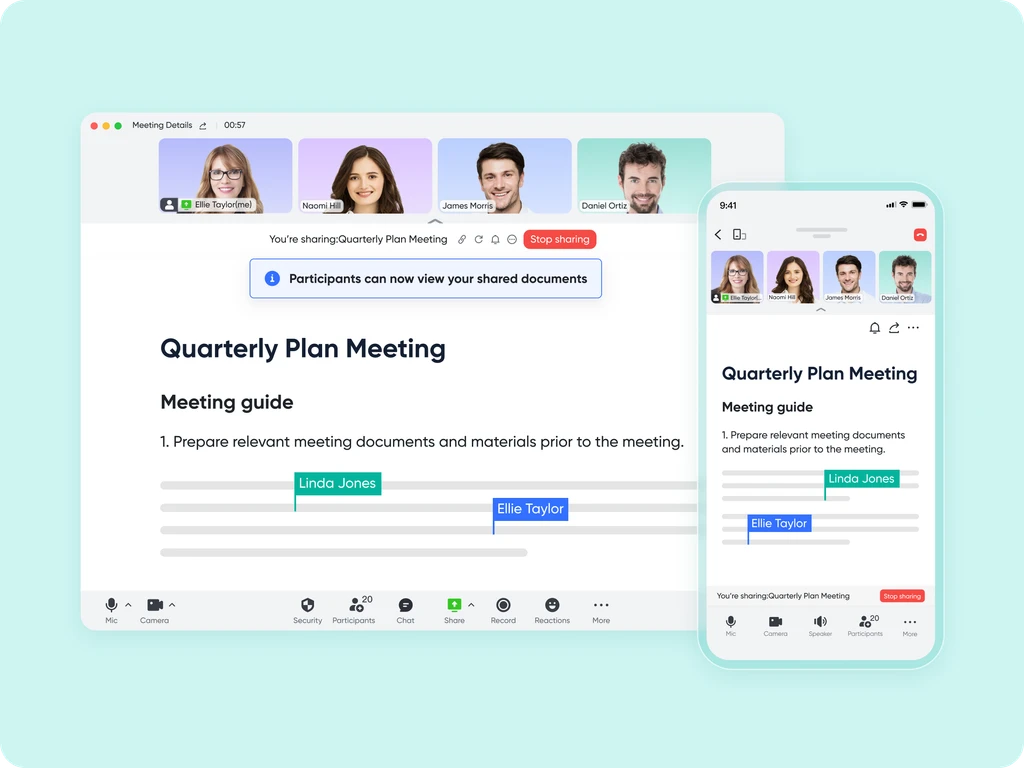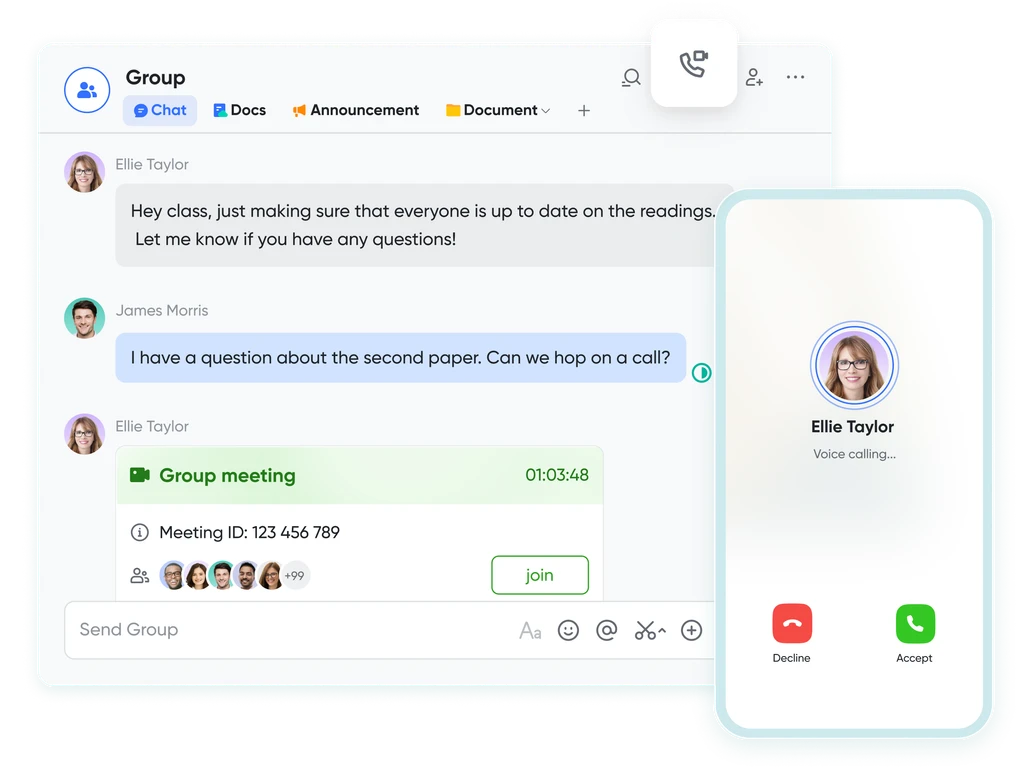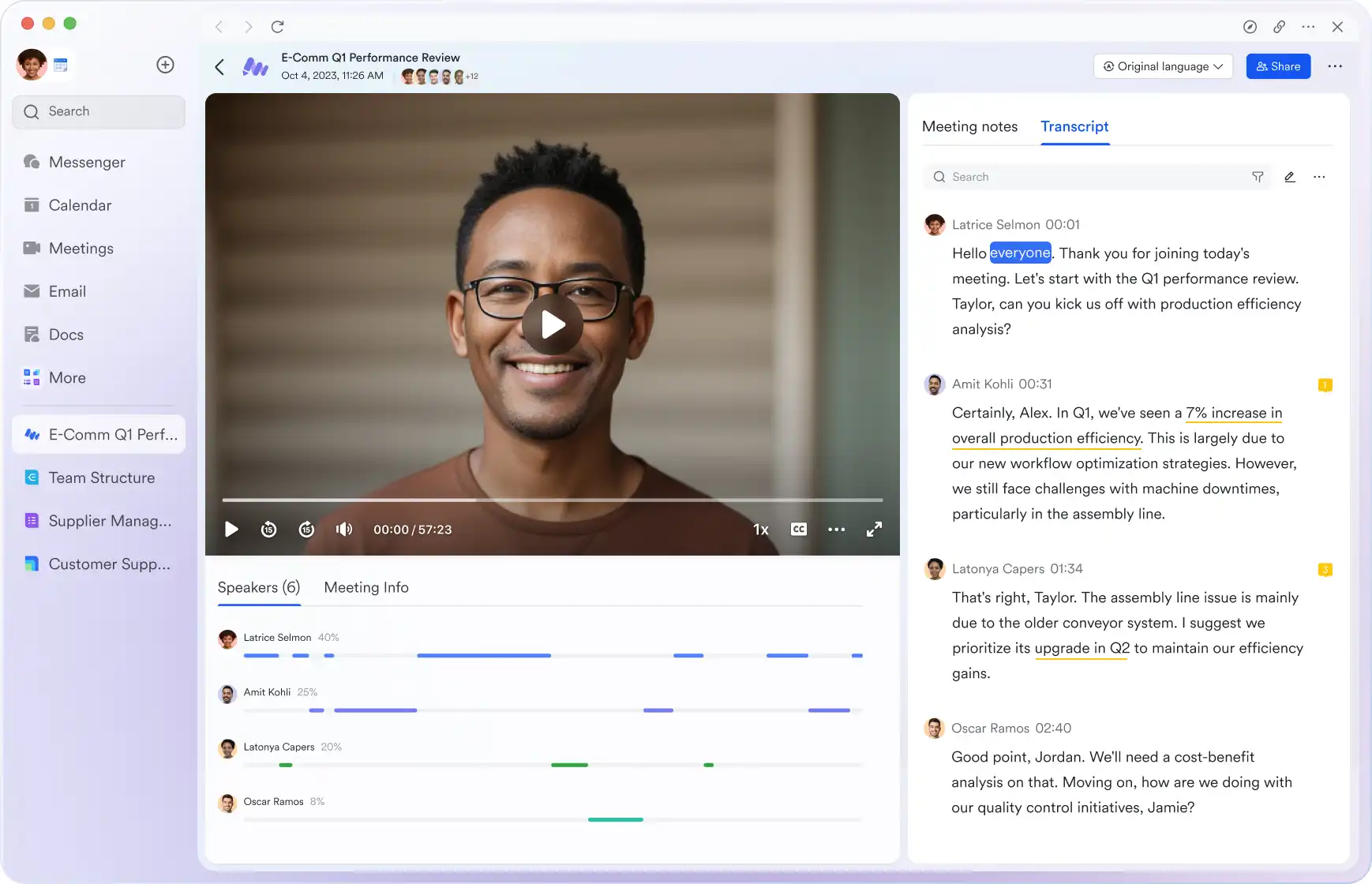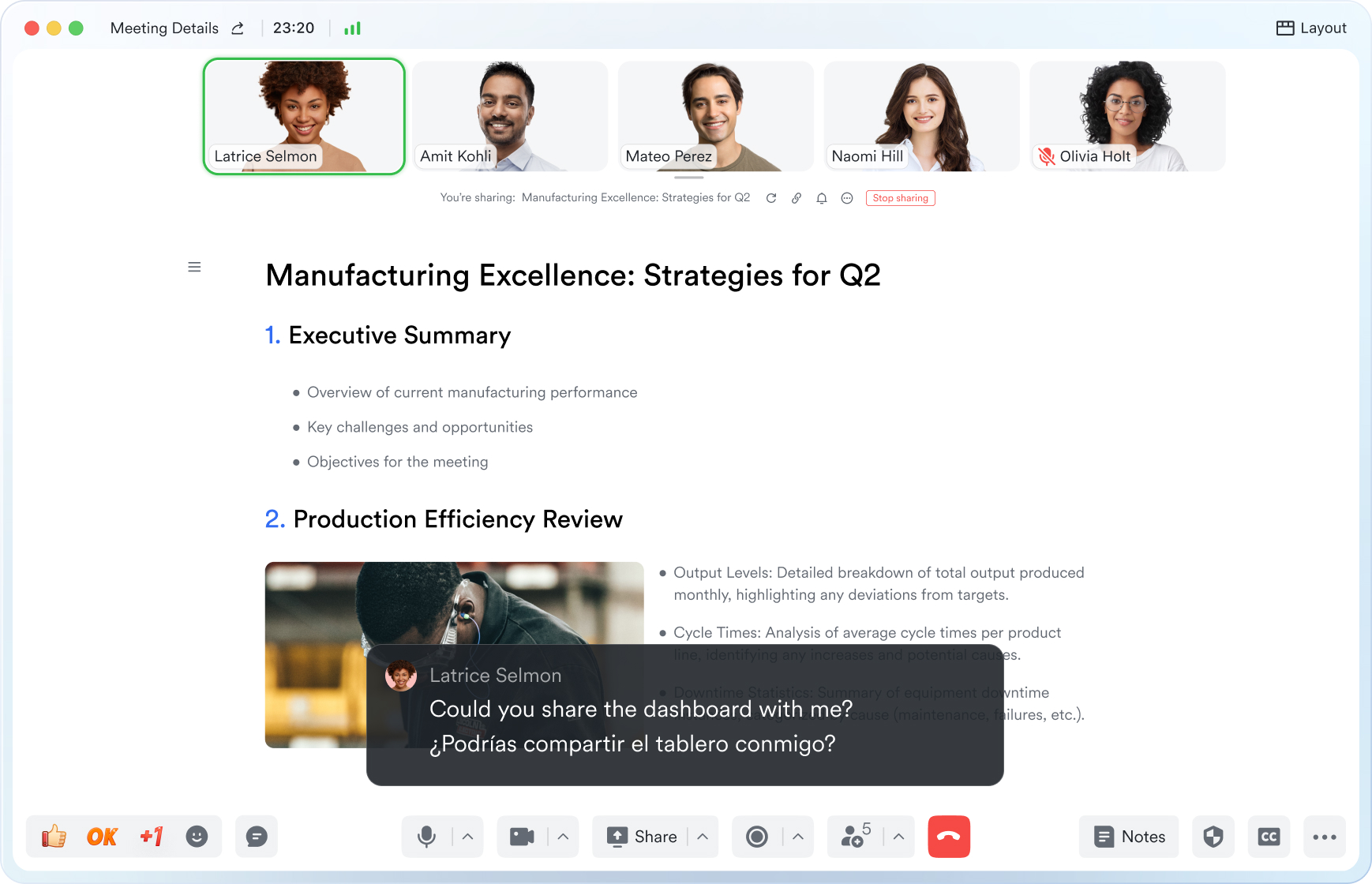Marketing Campaign Meeting
This guide will walk you through the essential elements of use marketing campaign meeting to keep your attendees aligned and engaged.
Try Lark for Free
In the dynamic realm of marketing, orchestrating impactful campaign meetings stands as a pivotal constituent of driving strategies and fostering organizational growth. This comprehensive guide is designed to equip marketing professionals with the requisite insights and strategies for steering successful marketing campaign meetings in 2024.
Use Lark Meetings to turn meetings into true collaborative experiences.
What is a marketing campaign meeting?
A marketing campaign meeting serves as a dedicated forum for stakeholders to converge and deliberate on various aspects of upcoming marketing initiatives. It acts as a strategic platform to delineate comprehensive plans, align efforts, and foster cohesive teamwork. The meeting aims to synchronize efforts, align strategies, and secure buy-in from key stakeholders. This collaborative approach ensures that the marketing campaign is meticulously planned and executed to meet its objectives.
Goals of a marketing campaign meeting
The primary objectives of a marketing campaign meeting encompass setting clear and achievable goals for upcoming marketing campaigns. These include:
- Aligning Strategies: Ensuring that all team members are aligned with the overarching marketing goals.
- Defining Key Performance Indicators (KPIs): Establishing measurable KPIs to gauge the success of the marketing campaign.
- Mapping Out Tactical Plans: Outlining the specific action plans and strategies to achieve the desired marketing outcomes.
The meeting also serves to foster coordination among team members, provide a clear direction, and garner support for the marketing campaign.
Who should attend a marketing campaign meeting?
The optimal composition of a marketing campaign meeting involves inviting a spectrum of stakeholders. This includes representatives from various departments such as marketing, sales, product development, and senior management. Involving team members with diverse perspectives and expertise ensures comprehensive discussions, well-rounded decisions, and widespread buy-in for the campaign.
Learn more about Lark x Meetings
Topics, agenda, and structure of a marketing campaign meeting
The topics and agenda of a marketing campaign meeting should be meticulously structured to cover key areas essential for the success of the upcoming marketing initiatives. This includes:
- Review of Previous Campaigns: Reflecting on past campaigns to glean insights and learning for the future.
- Discussion on Target Audience: Identifying and understanding the target audience to tailor the campaign effectively.
- Allocation of Resources: Planning the allocation of budget, personnel, and technological resources for the campaign.
The structure of the meeting should facilitate constructive dialogue and decision-making. It is essential to maintain a clear agenda to ensure discussions stay on track.
Learn more about Lark x Meetings
How often does a marketing campaign meeting occur?
The frequency of marketing campaign meetings is contingent on the scale and scope of the marketing initiatives. For comprehensive and impactful campaigns, regular meetings are essential. Monthly or bi-monthly meetings are often sufficient to ensure strategic alignment, progress tracking, and necessary adjustments in the campaign strategy.
Key difference between a marketing campaign meeting and another similar meeting
The key differences between marketing campaign meetings and other gatherings, such as general team meetings or brainstorming sessions, lie in their focused nature and specific emphasis on campaign strategies, target audience, and resource allocation. Marketing campaign meetings are distinct in their alignment with overarching marketing objectives, making them crucial for driving successful campaigns.
Learn more about Lark x Meetings
Three practical examples of marketing campaign meetings
Example 1: launching a new product campaign
Example 1: launching a new product campaign
In this scenario, the marketing campaign meeting centered around devising a holistic strategy for the launch of a new product. The meeting brought together cross-functional teams to carve out a synchronized approach, aligning product positioning, marketing messaging, and promotional activities.
Example 2: seasonal promotional campaign
Example 2: seasonal promotional campaign
This meeting revolved around planning a seasonal promotional campaign, featuring in-depth discussions on aligning the campaign with the festive season, tailoring promotions to target audience preferences, and optimizing marketing channels for maximum impact.
Example 3: rebranding initiative
Example 3: rebranding initiative
A marketing campaign meeting was convened to strategize a rebranding campaign. This involved comprehensive discussions on redefining brand messaging, revamping marketing collateral, and prepping the team for a phased rollout of the rebranding initiative.
Common pitfalls of a marketing campaign meeting
While marketing campaign meetings are pivotal for success, they can encounter potential pitfalls, including:
- Lack of Clear Objectives: Meetings without clearly defined objectives can lead to aimless discussions and ambiguous outcomes.
- Inadequate Participation: Limited involvement from critical stakeholders can impede the meeting's effectiveness and consensus-building.
Mitigating these pitfalls requires proactive planning, clear communication, and diligent adherence to the meeting agenda.
Related:
Master the Art of Meeting Notes with Lark for Enhanced Collaboration | Lark Blog | Lark BlogLearn more about Lark x Meetings
Dos and don'ts of a marketing campaign meeting
| Do's | Don'ts |
|---|---|
| Clearly define meeting objectives | Overwhelm the agenda with irrelevant discussions |
| Encourage active participation | Disregard team members' perspectives |
| Provide concise meeting summaries | Extend the meeting unnecessarily |
What makes a virtual marketing campaign meeting successful?
Hosting successful virtual marketing campaign meetings necessitates:
- Robust Technological Infrastructure: Reliable video conferencing platforms and collaborative tools are imperative.
- Engaging Presentation: Utilization of engaging and interactive presentation formats to maintain participant involvement.
Fostering seamless communication and interaction is the cornerstone of a successful virtual marketing campaign meeting.
Learn more about Lark x Meetings
Typical takeaways of a marketing campaign meeting
Successful marketing campaign meetings yield several key takeaways, including:
- Aligned Campaign Strategy: Clear consensus on the campaign's direction and strategic focus.
- Defined Action Items: Clarity on the tasks, responsibilities, and timelines for executing the marketing campaign.
These takeaways serve as the foundation for steering the marketing campaign towards success.
Questions to ask in a marketing campaign meeting
Here is a curated list of insightful and pertinent questions to guide productive discussions and decision-making during marketing campaign meetings:
- What are the primary objectives of the upcoming marketing campaign?
- How do we plan to segment the target audience for this campaign?
- What resource allocations are required to support the campaign's success?
- What key performance indicators (KPIs) will we use to measure the campaign’s effectiveness?
Learn more about Lark x Meetings
Conclusion
In summary, orchestrating successful marketing campaign meetings is indispensable for crafting and realizing impactful marketing strategies. By aligning stakeholders, defining clear objectives, and leveraging collaborative platforms, organizations can maximize the efficacy of their marketing initiatives and propel sustained growth.
Use Lark Meetings to turn meetings into true collaborative experiences.
A Game Changer for Marketing Campaign Meeting: Empower your team with Lark Meetings
In the fast-paced and dynamic world of modern business, effective communication and collaboration are crucial for success of Marketing Campaign Meeting. Here we introduce Lark Meetings to serve as a centralized hub for all communication needs.
Transform your meetings into collaborative endeavors

Leverage the potency of in-call document sharing, intelligent meeting minutes, and mobile-optimized features to enhance productivity collaboratively, irrespective of your location or schedule.
Seamlessly collaborate in real-time, across any device

Share live documents instead of just screen views. Participants can navigate and edit simultaneously within the video call window, even while on the move.
Shift your focus to engagement, not note-taking

Lark Minutes automatically converts video meetings into transcripts, facilitating easy viewing, searching, and collaborative editing. Stay in the loop asynchronously, even if you can't attend the live meeting. Lark Minutes for meeting minutes support translation into 10+ different languages.
Break language barriers in communication

Lark Meetings provide real-time translation for subtitles, allowing individuals from diverse backgrounds to express themselves in their native languages. Ensure every voice is heard, regardless of geographical location. Live subtitles currently support translations from English, Chinese, and Japanese to 10+ different languages. See more translation feature in Lark.
Connect with larger audiences
Host dynamic online meetings and events accommodating up to 1,000 participants, with the flexibility of up to 50 breakout sessions for intimate group discussions within the larger meeting context. Try more Lark features for free.








